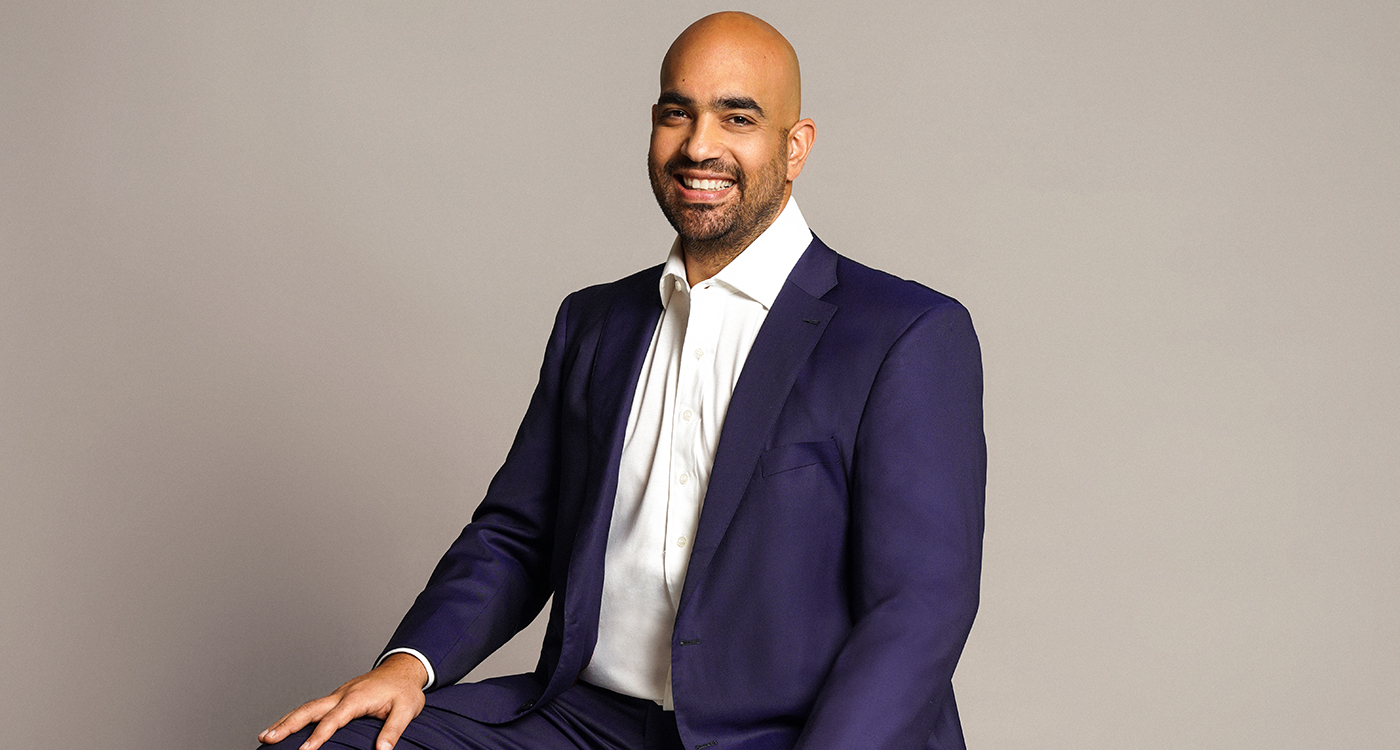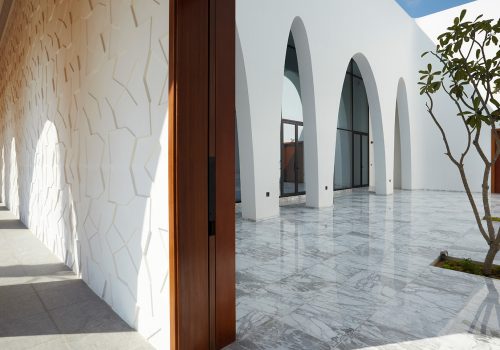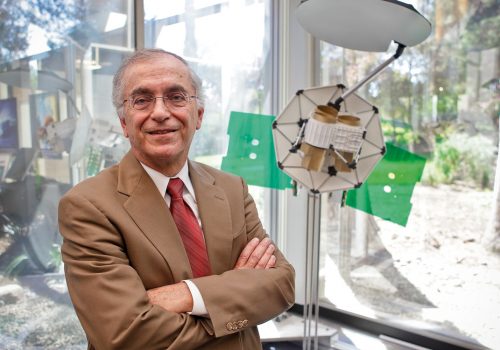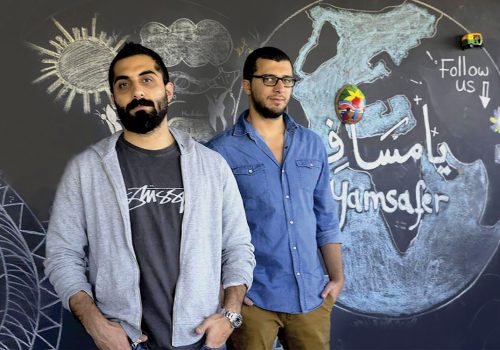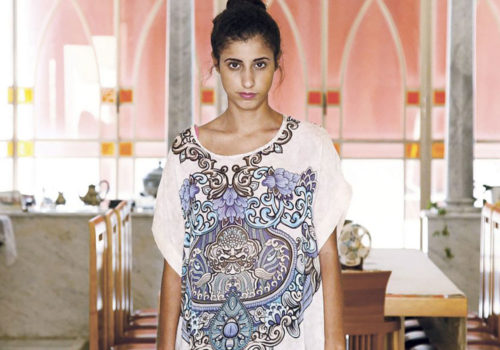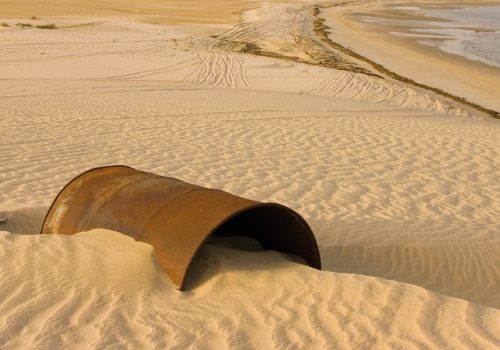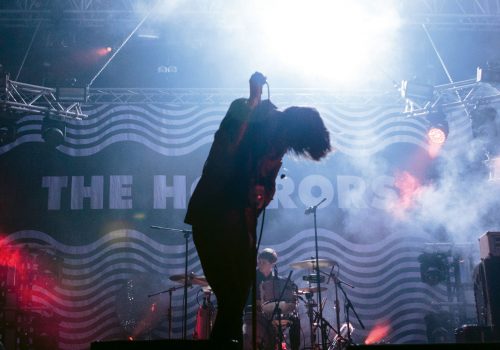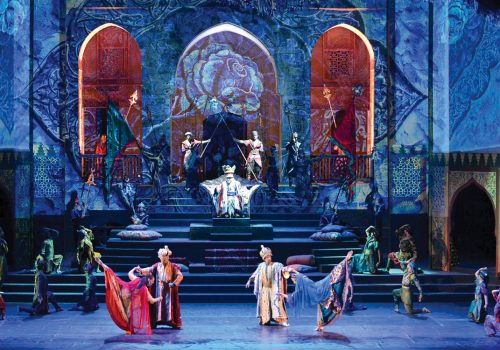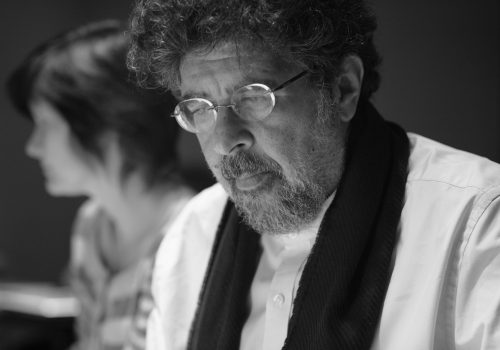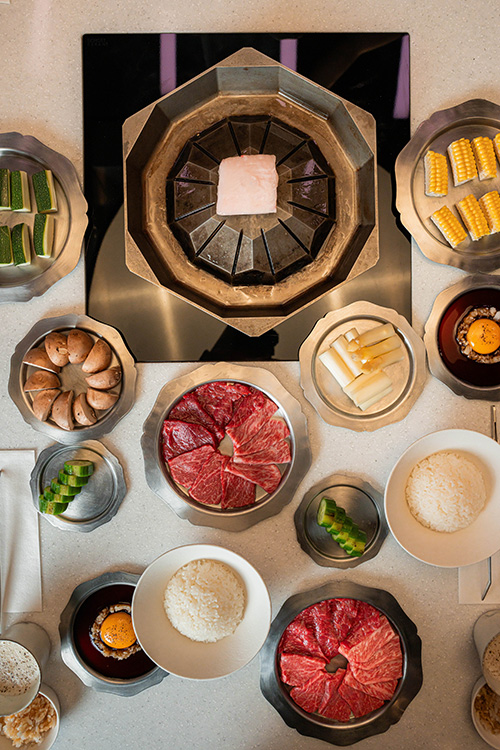
ABOVE: Yakinikumafia is a concept by Wagyumafia focussed on Yakiniku cuisine, a type of Japanese grill influenced by Korean barbecue, in which diners grill their own food over an open flame. It opened in Via Riyadh in 2023 but closed in September 2024.
If you visit Cool Inc.’s corporate website, you’ll discover it calls itself a chameleon due to the reptile’s ability to adapt to an ever-changing world. “The chameleon is distinctive and highly specialised,” the website rationalises, “He is charismatic and confident but maintains a powerfully discreet presence. He is the personification of what we are striving towards and the perfect emblem for our transformational journey.”
The backstory of Cool Inc., as I would soon discover, after spending a morning chatting away with one of its founders, is equally fascinating and the scope and scale of the company is mind blowing. Yet, like so many start-ups, it begins with the bond of friendship between its founding partners – Sinan Al Saady, who for many years headed ALJ Land (part of the Abdul Lateef Jamil group); Tal Nazer, the current CEO and board member of Bupa Arabia; and Mohyedin Kamel, a board member and Vice-CEO of Dallah Al-Baraka.
“At ALJ Land we were developing retail, wholesale, commercial and all other types of real estate, but I had this yearning to focus on hospitality assets, and in 2018 I began to see a major trend in the market with an explosion of experiential tourism. Even so, there seemed to be a narrowing of the market with everything falling under the Marriott Group,” Sinan Al Saady, the founder and CEO of Cool Inc. tells me. “I also happened to stay at 19 different Four Seasons properties that year and even though I had always revered the Four Seasons brand, I unfortunately had 19 average experiences.”
Apparently, these factors played on Al Saady’s mind, and they helped push him to start working on a business plan while he was still at ALJ so he might fulfil his dream of one day becoming an entrepreneur. His vision, he says, was a speed-to-market company developing small hotels from large homes in ultra-unique locations, but critically, with a service ethic that looked to anticipate guest demand. “I invested a lot of time and money on the feasibility study in collaboration with PwC in Zürich and in 2019 I decided to pull the trigger and go for it. We set up an office in Zug, hired a CEO to run things and while he was supposed to start in February 2020 and we had planned to make our first property acquisition before then building others, Covid hit, the CEO got cold feet and my plans got derailed. I decided to put a pause on the company and take stock and that’s when I was contacted by my two good friends Tal and Mohy, who were some of the only people who knew what I was up to.”
At this point, I too must take a pause and go back a year to better explain what Kamel and Nazer had been up to. You see, we are now in 2019 and Saudi Arabia was preparing for the inaugural Saudi Seasons festival in which residents and tourists could explore, experience, and embrace the country in a different light. Under the direction of Turki Al Sheikh – the Chairman of the General Entertainment Authority (GEA) – the ambitious plan was to build on the Saudi Vision 2030 goal of establishing the entertainment industry as a key component of the national economy. As it turned out, Mohyedin Kamel had presented an idea to the GEA and it involved bringing the best restaurants from around the world in the guise of pop-ups. “Mohy is a big foodie, but he also runs one of the largest conglomerates in the world with 67,000 employees and 304 businesses,” explains Al Saady. “His pop-up idea was brilliant and together with Tal, who runs the region’s largest insurance business, they managed to leverage their connections and convince 40 of the world’s most famous fine dining restaurants to come to Riyadh for around five days a pop across a two-month period.”
The Riyadh Season was a massive marketing success – not so much from a business perspective, given the revenues could not come close to the costs, but that wasn’t the point or purpose. “This was Mohy and Tal’s first FnB venture. They winged it, going to such crazy lengths as using Mohy’s private jet to go and fly in fresh fish from the South of France. It was crazy but it was a resounding hit and that’s what mattered.”
With the 2020 edition cancelled due to Covid, the two friends went back to their day jobs but towards the end of 2020, the GEA got back in touch and told them the Seasons Festivals would be starting again in January 2021. (Don’t forget the 2020 Saudi lockdown was only 45 days long, albeit international travel was not permitted until April 2021). This time however they realised the pop-ups needed to be more viable and as such they decided each restaurant needed to stay six to eight weeks, and the total number was lowered from 40 to 17 (in Riyadh, and 5 in Jeddah). Kamel and Nazer also agreed they ought to reach out to Al Saady and see if they could build something more permanent from their work. “They knew I was building my hospitality business and so we sat down together and decided to try and plug into the Saudi tourism ecosystem, especially given that Vision 2030 was proclaiming tourism to be the next oil. We said, ‘Let’s do restaurants, hotels, tourism, and let’s become the Aramco of tourism.’” Consequently Cool Inc. was born in September of 2020 (just a few months before the second edition of Saudi Seasons kicked off).
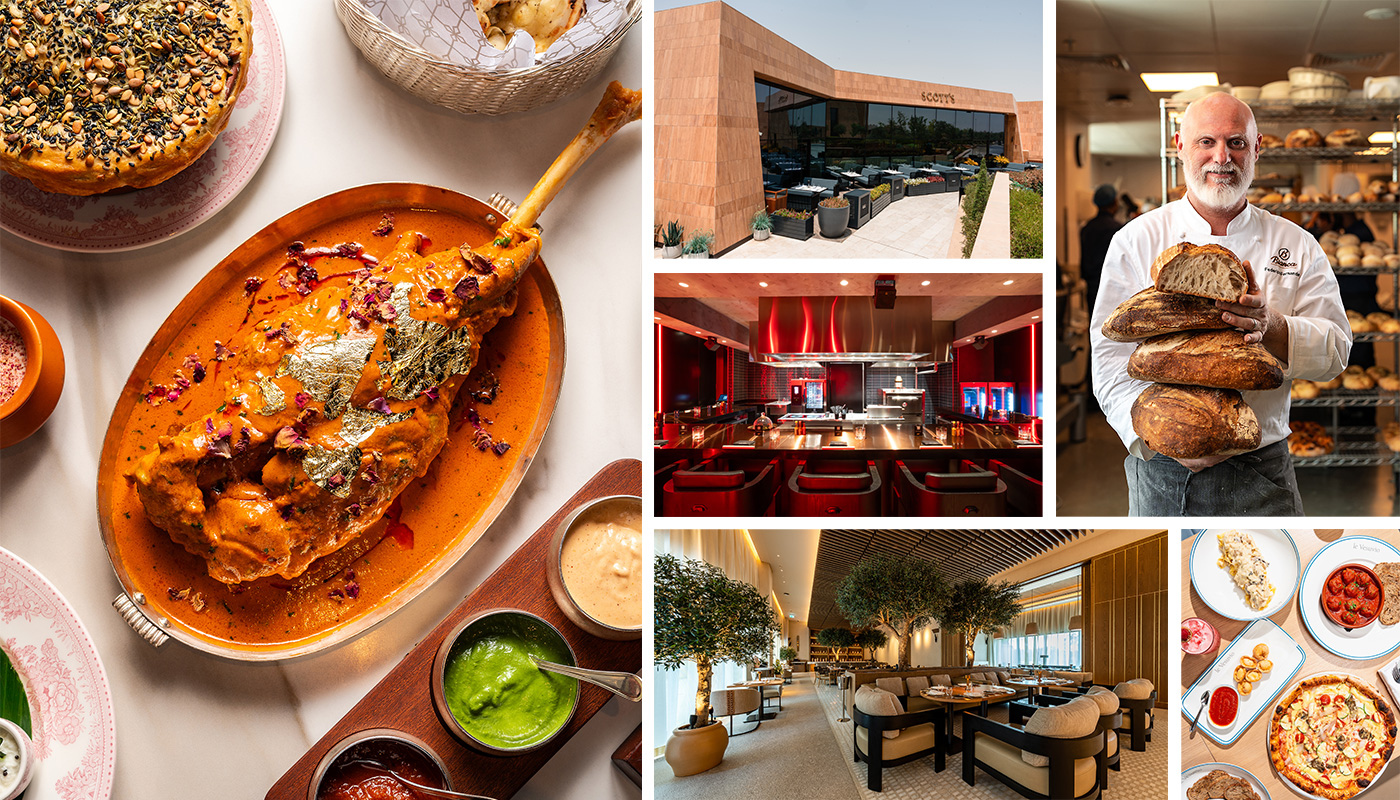
ABOVE (clockwise from top left): Gymkhana, which is still the only Indian restaurant in London to have received two Michelin stars, opened in Via Riyadh in 2023. Likewise Scott’s (of London’s Mount Street) opened in Via Riyadh, having never previously expanded in its 170 storied years. Bianca, the beloved LA-based restaurant and bakery concept is another to open in Via Riyadh. Japan’s Wagyumafia restaurants serve the world’s finest cuts of Kobe beef. Wolfgang Puck’s legendary flagship fine dining restaurant Spago. And finally some of the menu items at Le Vésuvio.
“I initially thought I’d be spending 50 per cent of my time on the restaurants and 50 per cent of my time on everything else but I ended up spending 95 per cent of my time on the restaurants because it’s the most consuming thing I’ve ever done,” explains Al Saady. “Opening one restaurant is a challenge but we opened 20 at once!”
It’s worth pointing out that before Cool Inc. and the Seasons Festivals there was no real fine dining market in Saudi Arabia. In fact, the restaurant sector was dominated by international casual dining players like Applebee’s, Outback Steak House, Chilis, and TGI Fridays. “We were really building the fine dining market,” adds Al Saady, “and trying to convince big names like Wolfgang Puck to enter a market that was so nascent was a big challenge. We had to sell our story.” It turned out that the credibility of this story was contingent on the fact they were coming in heavy.
“At first, we envisioned starting with eight restaurants because restaurants were only a small part of the business, we still needed to save capital to invest in hospitality, tourism, active recreation, and so on,” says Al Saady. “But, in May 2021, while we were negotiating with the international restaurants, we were contacted by Sela, a company that’s 98 per cent owned by the Public Investment Fund (PIF). They countered our thesis and said, ‘Why only eight restaurants? Why not 50?’ Obviously, there was no way we could raise the 2 billion USD or more that we’d have needed to open 50 restaurants. But, after some lengthy negotiations, they agreed to partially fund us with a capital placement, provide some rent relief, and offer us some incentives.”
That sounds logical but even with all the good will in the world it must have still been a daunting task to narrow down to twenty viable restaurants, right? “Actually, when we were looking at the concepts, we made sure to try and look years into the future and understand how it can become a part of the greater Saudi fabric of society. Tal, Mohy and I started on the food side, looking into what Saudis would like and what could do well. But a hunch alone cannot be considered as justification for investment so we also put together an excel sheet with 14 different metrics of why a restaurant could be successful and then we cross-matched our gut feelings versus the analytical matrices and from a list of 180-plus options we landed on the final 20.”
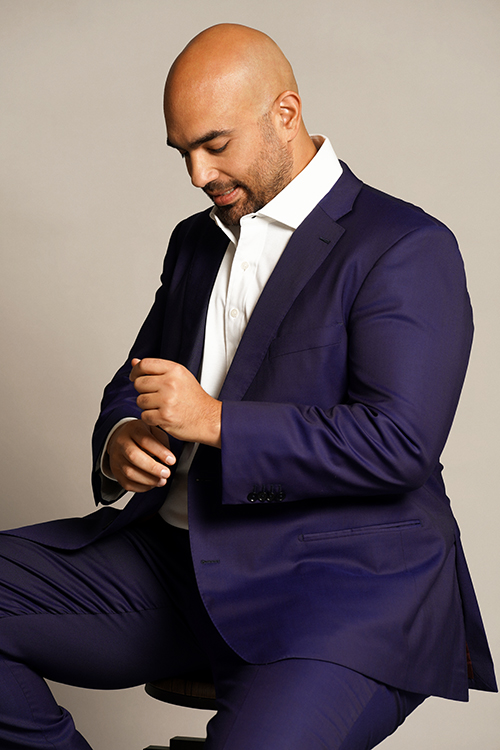
ABOVE: After completing a bachelor’s degree from Boston College in Finance and Economics, Sinan Al Saady went to work for NCB in Saudi Arabia before then joining one of the country’s leading property developers, ALJ Land. He is currently the CEO of Cool Inc., a company he co-founded with Mohyedin Kamel and Tal Nazer.
The capital required for such a venture was “huge” apparently but every aspect of their venture could be described as such. “We hired 1,500 people in just three months thanks to the efforts of 12 teams of recruiters who were scouring 67 countries including Argentina, Peru, Azerbaijan, the Philippines, India, Nepal and Uzbekistan.” But what about finding the right locations? Luckily, that part came a little easier, as the 20 restaurants are in two locations – with 14 restaurants in Via Riyadh and six in the Jeddah Yacht Club. “Thanks to our connection to Sela, we did not only get to choose the two best locations in Saudi Arabia, we were also part of the real estate development, working with them in creating the ideal property for the restaurants. Honestly, the barrier to entry is enormous for anyone who’d like to do something similar, as our landlords have put north of 600 million USD I’d guess to build those two properties.”
Nevertheless, competition has been rife. For, where Riyadh used to have two fine dining restaurants ten years ago, there are now 42, competing for a share of a relatively small market – even if it’s a city of 8 million people, the pool of people who go to fine dining establishments is still very small. “You’re right, it’s still a small market, and for three primary reasons,” explains Al Saady. “First of all, as a nation, we are price sensitive and if you’re not used to paying 120 USD to 200 USD a head, it’s not easy to get used to it. Secondly, changing habits takes time. And the last reason is the competition of time: not long ago your best bet on a night out in Riyadh was to play PlayStation at a friend’s house but now with the Seasons Festivals you have plays, Broadway, MDLBeast, DJ Tiesto three times a week, you have restaurants, Winter Wonderland, WWE, Riyadh Boulevard City. Honestly, we went from nothing to too much to do. So, our competition is not just share of wallet but capturing people’s time as well.”
Still, Al Saady takes comfort from the fact the metrics continue to paint a favourable picture. After all, 60 per cent of the Saudi population is under 35, which is a young parameter for fine dining. Moreover, female participation in the work force went from 6 per cent in 2016 to 36 per cent in 2023, ushering in the new phenomenon of dual income households and that has not just elevated household income, it has also facilitated increased consumption rates and wealth. It follows then that Cool Inc.’s medium- and long-term projections are still very positive, even if they’re pragmatic and consider that, internationally at least, 95 per cent of restaurants close within five years of opening. “We know we’ll have to move down the excel sheet and bring in new restaurants to replace the ones that don’t make the grade, that doesn’t worry us, especially as we have formed strong relationships that we can develop further. For example, we have opened Spago with Wolfgang Puck, but we also signed for a Cut with him, and a Chinois, so there’s plenty of bandwidth still.”
Behind the scenes, the large scope of their restaurant venture has benefitted from economies of scale. It seems their supply chain team, which comprises 21 people, are buying over 4,000 items a month with an annual spend of over 100 million USD. And on the labour force level with 1,500 staff and a current Saudisation requirement of 10 per cent, the fact that they sign 12-month contracts helps add an element of stability. “Our human capital turnover is around 25 per cent, which is in line with global standards,” adds Al Saady.
But Cool Inc. is much more than restaurants. They already have two other subsidiaries in fact. The first is called Ebda, which has entered as a minority shareholder in a 101-key resort in Albahah in collaboration with the Public Investment Fund’s tourism investment arm, Asfar. “It is an hour from the sea, two hours south of Makkah, and 2,400 metres above sea level,” Al Saady reveals. “Albahah is the greenest area of Saudi Arabia and great for hiking, biking, plus there’s a rally that happens once a year and it’s a place that many Saudis love to drive to, as it has some brilliant roads. The hotel will be managed by Accor as a Mantis when it opens in March 2025, blending the natural allure of mountain lodging with adventures and local heritage.”
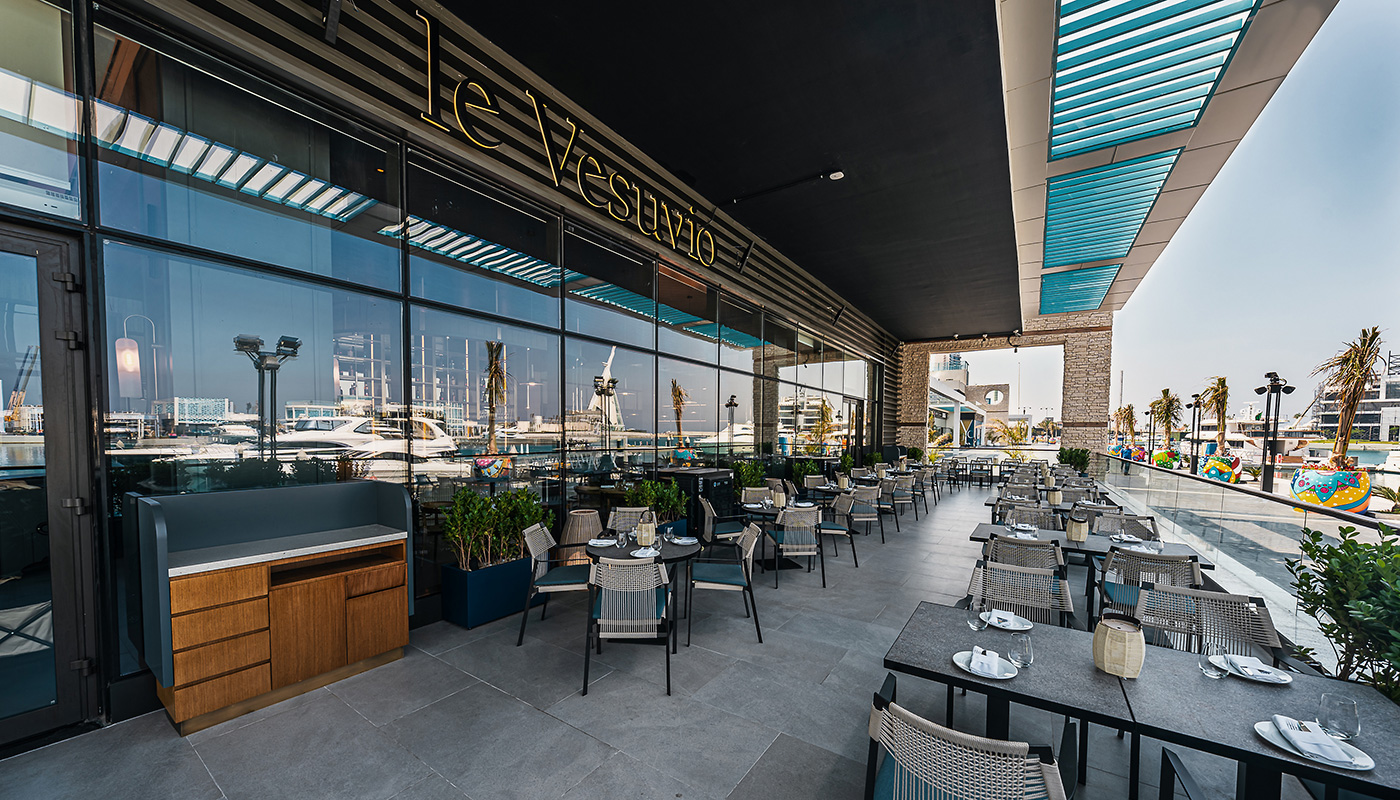
ABOVE: With its timeless charm and modern Italian cuisine, Le Vésuvio has been charming A-listers and jet-setters in Cannes, France, since 1969 but it has never spread beyond the Côte d’Azur, till now. With its new location at the Jeddah Yacht Club, there’s a real sense of Riviera chic.
The other subsidiary is a destination management company (DMC) tour operating business named Roam. “For Roam, we partnered a British company called Pelorus with the idea that, if we have hotels, restaurants, and active recreation facilities, then Roam is what brings all of these components together. We are already building itineraries for global clients coming into Saudi, whether from China, India, the US, the UK and so on. For example, we have a contract with Neom, where we have a fleet of cars and drivers and a team of over 200 people so when people want to go to Neom, we show them the sights. We have also taken many of the international football stars playing in Saudi now to AlUla and we are working with the Ministry of Economy & Planning for a delegation of over 800 people coming to the Jeddah Economic Forum.”
In essence, Cool Inc. is trying to show a new side of Saudi, or as Al Saady puts it, “The real Saudi, the Saudi you could not see otherwise.” And that’s an important mission, especially when so many global travellers still would not consider a trip to the Kingdom. “There’s still a big role that the government needs to do in terms of infrastructure before we start achieving tourism goals but our role as Cool Inc. is to activate that and be the catalyst in bringing the people. It’s a long game but we want to be the company that merges the where-togo, where-to-stay, what-to-do, so when someone wants to come to Saudi, we’ll be the ones flying them in, building their itineraries, feeding them, and housing them.” High ambitions indeed.


